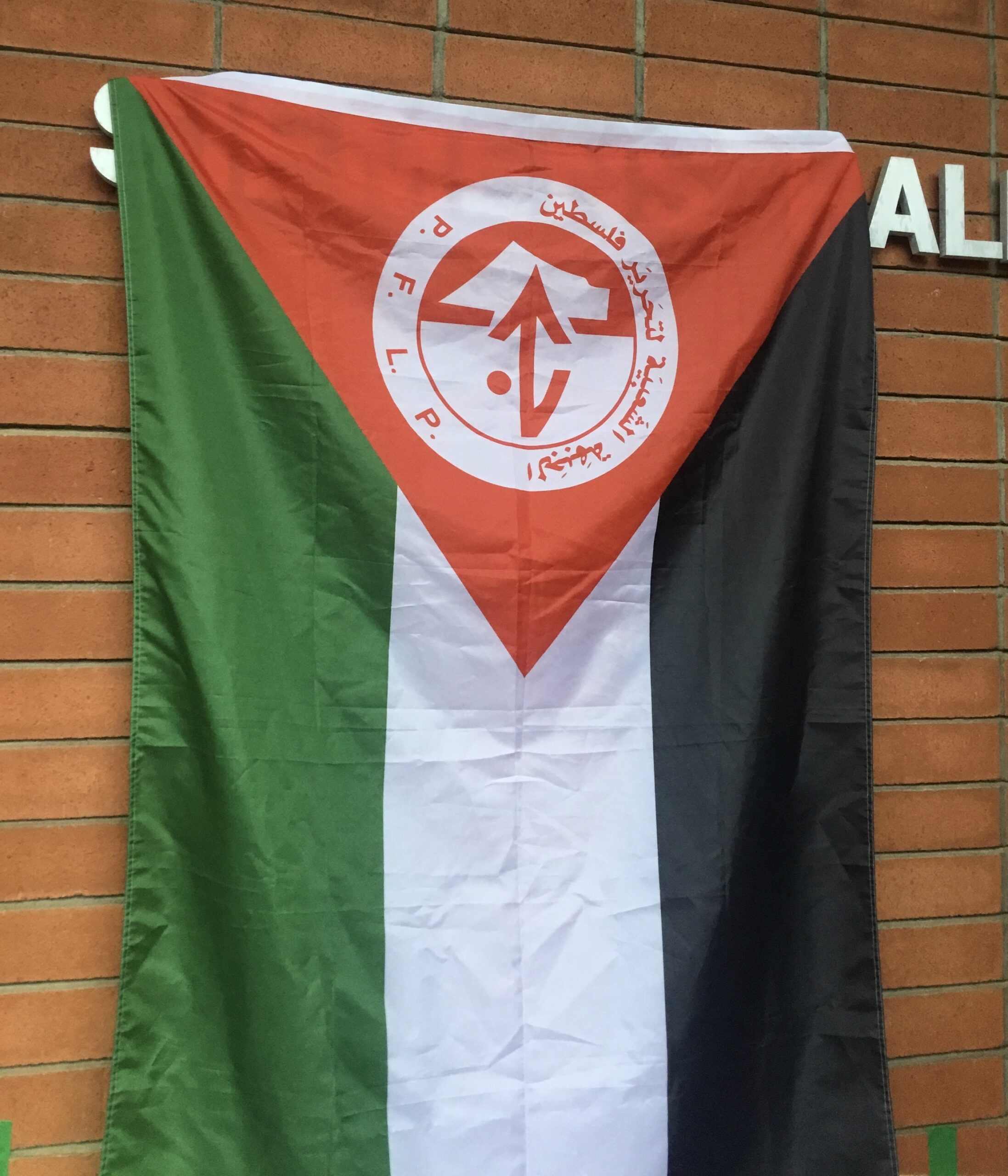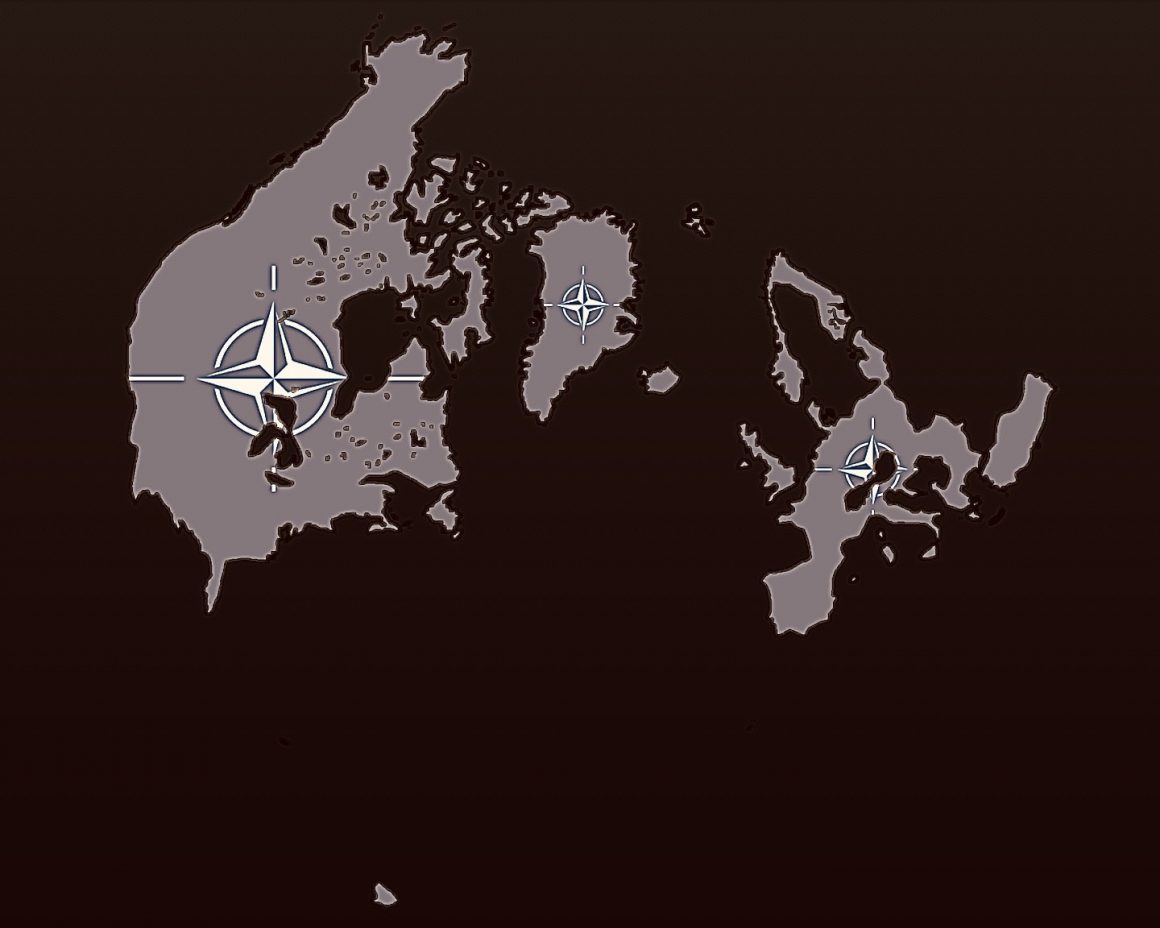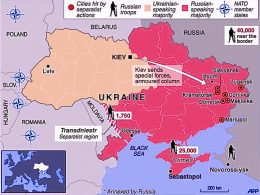Art above by Michael Barboto
The events of the last year and a half have vindicated the stance on Russia’s special military operation held by the DPRK, by Global South movements like the one in Burkina Faso, and by the most principled elements of the U.S. anti-NATO movement; this stance being that Russia has overall aided the anti-imperialist cause. In the early days of the operation, when the situation felt harder to figure out for those who don’t share the geopolitical insights of the pro-Russian formations, the Democratic Party tailists tried to justify distancing themselves from Russia’s action by claiming the operation appeared to overall be hurting anti-imperialism.
In the Party for Socialism and Liberation’s February 2022 statement on the operation, this argument took the form of a list of the ways the imperialists were maneuvering to strengthen their control; the missing context being that this “strengthening” only took place within the countries where Washington can still exercise leverage:
There is no guarantee that Russia’s effort to reverse the geopolitical situation in its favor will succeed. So far, the events of the past several days have allowed U.S. imperialism to secure key objectives. The critical NordStream 2 pipeline that would have brought massive amounts of Russian gas into the European market is no longer going forward. NATO troops have been and will continue to flood into the Eastern European members of the alliance, including the Baltic countries that share a border with Russia. Just today, the Pentagon announced that it was sending 7,000 additional soldiers to Europe. While Russia clearly aims to install a friendly government in power in Kiev, public support inside of Ukraine for the country’s membership in NATO — which has never been a completely dominant position — will undoubtedly surge in the aftermath of the invasion.
To be able to disavow the operation, without looking like they didn’t care about the Donbass communities who were under threat from Ukrainian fascism, the PSL’s leadership had to depend on ignorance about just how clear and serious this threat was. The statement briefly referred to the “plight of ethnic Russians, especially those in the Donbas region of Eastern Ukraine.” Yet it didn’t talk about the specifics of this plight: that these communities had that month begun to experience an invasion from the Ukrainian fascist state. An invasion wherein Kiev was increasing its shelling of the Donbass by 400%, in an attempt to take back the breakaway territories and then commit ethnic cleansing within them. The statement tried to distract from this reality by claiming the governmental influence of the Nazis had greatly decreased in recent years, omitting the influence of the unelected Banderite national security state which truly rules Ukraine; as well as the ongoing pro-Nazi policies of this state.
It’s on the basis of such a misleading series of arguments that the anti-Russian socialist groups throughout America and Europe have presented their accounts of how the new cold war is going. Not only are they minimizing the threat of Banderite fascism; they’re more broadly trying to make U.S. power look much stronger than it actually is. These two big parts of the case against Russian action in Ukraine are also the two things the State Department wants us to believe the most; and the idea about how Russia’s action has supposedly strengthened U.S. hegemony is at this moment the most damaging idea towards the anti-imperialist cause. This is because in order to effectively wage its planned hybrid war against BRICS, Washington depends on the perception of its global influence still being as strong as it used to.
To keep favor with the liberal NGOs which will only ever associate with “socialist” orgs that disavow Russia, these orgs have narratively aided the new cold war’s next stage. To undo this harm, we need to present a counter-narrative, which is to say a correct view of the effects this conflict has had on Washington’s global standing. This view, one which takes into account not just what’s happened within the areas of U.S. control but also what’s happened in the wider world, was articulated earlier this year by Carlos Garrido’s book The Purity Fetish and the Crisis of Western Marxism:
From failed coup attempts in Nicaragua, Venezuela, Cuba, and other countries; to the failed ‘Summits of the Americas;’ to failing proxy wars against Russia and China; it becomes an undeniable fact that the ruling class cannot continue ruling in the old way, that the age of American imperialist unipolarity is over. As the world continues to turn towards China for win-win relations in international trade; as la Patria Grande turns its leftward turn and its hemispheric unity against the U.S.’s Monroe Doctrine style engagement with the region; as movements towards de-dollarization occur across the planet; as European citizens continue to protest again the deterioration of their material conditions by the U.S. and NATO’s proxy war against Russia; this crisis in the ruling class will show itself to be more pronounced.
Such a comprehensive, macro-focused way of looking at the conflict’s impacts, in which we recognize how imperialism’s “wins” within the conflict have come at the cost of better conditions for revolution, is informed by Lenin’s assessment of what it takes for a revolution to happen. Lenin concluded that for the proletariat’s victory to be possible, there needs to be a crisis which both gives the workers an incentive to rebel, and impacts the ruling class itself. With the decline of U.S. hegemony, the capitalists can no longer rule in the way they used to; they have a plan for trying to keep the power structure in place, but that plan’s success depends on Marxists failing to properly navigate our conditions. And should enough of us choose to reject Democrat tailism, which a growing amount of us are, we’ll make capital’s self-preservation strategy untenable.
The strategy of the finance capitalists—U.S. capital’s dominant present wing, as represented by the Democratic Party and its media—is to use liberal fascism to suppress and discredit all authentic opposition towards imperialism. This type of fascism is exemplified by the DOJ, which unlike the three-letter agencies depends on strong public relations to be able to carry out its attacks against the class struggle. When the DOJ indicted members of the African People’s Socialist Party this year in retaliation for their countering the Ukraine psyop, it felt comfortable doing so because what we call the “left” in this country primarily sides against any serious anti-imperialist effort. When PSL’s ANSWER organizers used their March rally this year as a platform for attacking the pro-Russian orgs, this enabled the DOJ. And, by extension, it enabled the RESTRICT act, the bill which was shortly introduced that would codify the legal logic behind the APSP indictments.
As the anti-imperialist coalition the pro-Russian orgs are part of is prompted to resist the hybrid war against BRICS, as well as the intensifying war on Africa, this coalition is going to be targeted like APSP has been. The guardians of the liberal cultural hegemony are seeking to make these formations look like they don’t deserve the public’s support, so that it can appear justifiable to censor and persecute them. The central narrative these propagandists are using is that anybody who opposes the liberal cultural hegemony is marginal and ineffectual, something that MSNBC’s Rachel Maddow said about the Rage Against the War Machine organizers. It’s a campaign of demoralization; it extends both to the domestic organizational scene (where they claim anti-imperialists represent a fringe conspiracy circle), and to the global scene (where they claim Russia has failed and BRICS is doomed to fail).
We can refute these narratives by saying to the American people: look at what’s happening outside the country, and outside Washington’s globally small range of control. The gains of the forces which oppose empire are speeding up. As commentator Brad Pearce has written after this last month’s anti-colonial actions by several African countries:
West Africa’s drive for further independence has left Atlanticists concerned about the opening this leaves for Eurasian powers like Russia and China to increase their influence in Africa. The west’s reaction reflects a lack of respect for the sovereignty of African countries, viewing the continent merely as a theater to maintain global dominance. Since the Ukraine war’s onset in early 2022, Atlanticists have expressed alarm over the unwillingness of Global South states to support the west’s anti-Russia policies, a trend further amplified by the shift to multipolarism everywhere. This weakening of western hegemony has opened a path for many nations to avidly explore their geopolitical options and diversify their economies. A report from the Munich Security Conference held in February highlighted this very real schism with the west: “Many countries in Africa, Asia, and Latin America have steadily lost faith in the legitimacy and fairness of an international system which has neither granted them an appropriate voice in global affairs, nor sufficiently addressed their core concerns. To many states, these failures are deeply tied to the west. They find that the western-led order has been characterized by post-colonial domination, double standards, and neglect for developing countries’ concerns.”
We can also say to the people: look at how much our domestic anti-imperialist movement has been gaining strength due to the efforts by the pro-Russian orgs to build an antiwar movement outside the Democratic Party’s influence. 2023 has been the best year for the antiwar cause since the anti-Bush movement, and even that movement lacked some important aspects which the present effort doesn’t. The anti-Bush movement was much bigger, but the sources of leadership that captured its spontaneous mass energy were liberal tailist groups like ANSWER. As a consequence, it couldn’t be sustained. The anti-NATO movement that’s appeared in response to Ukraine is led by groups that are hostile towards the Democratic Party and its ideas, so it can’t be diluted.
The “Russia’s action overall helped American power” myth is foundational to the longer-term propaganda campaign against the anti-imperialist cause; to the arguments against joining this rising anti-imperialist movement. It’s what gives perceived credibility to the narrative that BRICS is doomed to fail, which is the only story the liberals have left to tell. In this timeline where Biden’s Ukraine gamble has failed, forcing the empire to retreat at an even faster pace than it was prior to the proxy war, the narrative managers have to tell their people that the USA remains able to win the great-power competition. It’s a lie that grows more absurd all the time, but that the empire needs to tell in order to avoid a breakdown of our liberal cultural dominance. Should the anti-imperialist movement gain more influence over the mass consciousness, this dominance will be lost; as awareness of the wonders which are occurring due to multipolarity’s rise will become widespread within our culture.
To try to prevent this shift in society’s thinking, the narrative managers are cultivating a perception that history isn’t fundamentally moving forward; that whatever disruptions we see happen, American primacy can’t be defeated. This perception is shared by all members of our ruling institutions, even the ones who recognize the exploitative nature of the American world order. Jim O’Neill, the Goldman Sachs economist who coined the term BRICS, talks about the predatory relationship which American finance capital has with the peripheral countries; yet he’s come out to claim that BRICS doesn’t truly represent a threat to the dollar.
About the plans of BRICS to build a new world currency, he says: “None of these things will ever happen until those countries want to have their currencies used by people in other parts of the world.” Is this such an implausible thing, though, if the PRC not only does want its currency to become used by these countries, but has been getting a growth amount of left-leaning Latin American governments to adopt this currency? The present trend is objectively in favor of what BRICS seeks to accomplish, and Africa’s recent revolutionary developments have further demonstrated this.
If the objective conditions for revolution in the core are coming into being, both within the international sphere and within the USA itself, then the ruling class can ultimately only respond by trying to prevent the emergence of the subjective conditions. Of the types of conditions in which the most conscious element of the workers has built an organizational structure capable of defeating the state, and has built enough of a relationship with the people for this revolution to have popular backing.
The objective conditions for workers victory have been made more present than ever by the Ukraine miscalculation our elites have made. They’ve accelerated the inflation crisis, creating another great shock to the lives of workers whose effects can’t be reversed by any liberal policies. The subjective conditions still aren’t here yet, though the antiwar movement’s resurgence and liberation from the Democrats has brought those conditions closer; to win, communists first have to build a substantial relationship with labor power.
That’s the next big front within our campaign to end the Democratic Party’s organizing dominance. PCUSA, one of the pro-Russian RAWM member orgs, has already built a good union presence; but we still need to defeat the liberals within this arena, including the “red” liberals who represent the revisionism and reformism of orgs like CPUSA or PSL.
We can expect the next big maneuver against the principled element of the communist movement, and against the non-left anti-imperialist orgs which work with this element, to come with the next false flag against anti-imperialists. In order to pass the RESTRICT act, the liberals need more of a justification. At this point, that justification is all they’re waiting for, and they could get it by pinning a crime on the anti-imperialist movement. Perhaps they’ll do this by claiming the most prominent orgs and individuals in the movement are carrying out interference within the 2024 election, a narrative that would build upon the Russiagate psyop. We don’t know everything about how the next year or so could go, but given the urgency to suppress anti-imperialism which Biden’s Ukraine failure has brought, it now feels such an intensification of the repression is coming sooner rather than later.
————————————————————————
If you appreciate my work, I hope you become a one-time or regular donor to my Patreon account. Like most of us, I’m feeling the economic pressures amid late-stage capitalism, and I need money to keep fighting for a new system that works for all of us. Go to my Patreon here.
To keep this platform effective amid the censorship against dissenting voices, join my Telegram channel.








